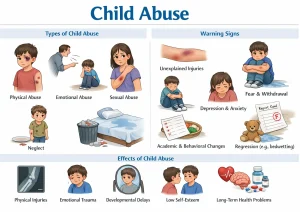Overview
Diagnosis
Identifying child abuse or neglect can be challenging and requires a thorough evaluation of the situation, including physical and behavioral observations.
Factors that may be considered in determining child abuse include:
-
Physical examination to assess injuries or signs of abuse or neglect
-
Lab tests, X-rays, or other diagnostic tests
-
Review of the child’s medical and developmental history
-
Observation of the child’s behavior
-
Monitoring interactions between the child and parents or caregivers
-
Discussions with parents or caregivers
-
Talking directly with the child, when possible
If child abuse or neglect is suspected, it must be reported to the appropriate local child welfare agency for further investigation. Early identification is crucial to ensure the child’s safety and prevent future harm.
Treatment
Treatment focuses on protecting the child, ensuring safety, and preventing further abuse while addressing the long-term psychological and physical effects.
Medical care
-
Seek immediate medical attention if a child shows signs of injury or changes in consciousness.
-
Follow-up care with a health care provider may be needed to monitor recovery and ongoing safety.
Psychotherapy
Therapy can help both the child and the parents involved. Counseling may:
-
Help the child rebuild trust and learn healthy behaviors
-
Teach conflict management and improve self-esteem
-
Support the development of positive parent-child relationships
Effective therapy options include:
-
Trauma-focused cognitive behavioral therapy (CBT): Helps the child manage distressing emotions and trauma-related memories. Later, sessions may include the non-abusive parent and child together to discuss the experience safely.
-
Child-parent psychotherapy: Focuses on strengthening the parent-child bond and building emotional security.
Therapy can also assist parents by helping them:
-
Understand the causes of abusive behavior
-
Learn healthy coping and parenting strategies
-
Manage frustration and stress in positive ways
If the child remains at home, social services may conduct regular visits to ensure basic needs like food and safety are met. Children placed in foster care may require ongoing mental health support.
Where to turn for help
If you are at risk of harming a child or suspect someone else has abused or neglected a child, seek help immediately. Contact your health care provider, a local child welfare agency, the police, or a child abuse hotline.
Advertisement

